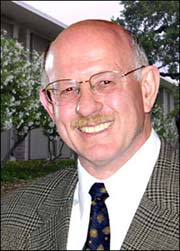
Handy Links
SLAC News Center
SLAC Today
- Subscribe
- Archives: Feb 2006-May 20, 2011
- Archives: May 23, 2011 and later
- Submit Feedback or Story Ideas
- About SLAC Today
SLAC News
Lab News
- Interactions
- Lightsources.org
- ILC NewsLine
- Int'l Science Grid This Week
- Fermilab Today
- Berkeley Lab News
- @brookhaven TODAY
- DOE Pulse
- CERN Courier
- DESY inForm
- US / LHC
SLAC Links
- Emergency
- Safety
- Policy Repository
- Site Entry Form

- Site Maps
- M & O Review
- Computing Status & Calendar
- SLAC Colloquium
- SLACspeak
- SLACspace
- SLAC Logo
- Café Menu
- Flea Market
- Web E-mail
- Marguerite Shuttle
- Discount Commuter Passes
-
Award Reporting Form
- SPIRES
- SciDoc
- Activity Groups
- Library
Stanford
Around the Bay
Dorfan Today

We are living through an information revolution, which has an important impact on how scientists disseminate their work, and gain access to their colleagues' research. A wealth of information is now available on the internet but we lack the organizational structures to access it efficiently. Real thought and discussion are needed so we can take ownership of these developments and make the necessary changes to facilitate the way we work.
In High Energy Physics, and increasingly in other fields of science, researchers are forming larger and larger collaborations and are collecting huge data sets with very long legacies. This science is almost all publicly funded research and we owe it to the taxpayers to work out the most efficient way to share and recover information.
This is why I was delighted that the SLAC Library took the initiative to organize The Information Resource Summit held at SLAC on Thursday and Friday of last week. This meeting brought together many information providers from particle and particle astrophysics to explore how we can work together to develop the next generation of information-discovery and communication systems that scientists will need over the next ten years. The international group focused on how science is changing and what new communication systems are needed. Participants shared information about a host of technical details, their users, and the services they offer. Most importantly, they agreed to develop a collaborative structure and a concrete set of tasks to establish a permanent partnership. This agreement to set up a collaboration between labs, publishers and other information providers is a first in High Energy Physics and is potentially a model that can be taken up by other fields of science.
It's perhaps fitting that this workshop is taking place at SLAC. Nearly two decades ago, Louise Addis took a software package produced at Stanford and created SPIRES, the world's first Web-based data access system.
Congratulations to all who worked hard to make this workshop a success. It is a great example of how imaginative thinking and effective collaboration can guide the rapidly changing sociology of science.
—Jonathan Dorfan, SLAC Today, May 14, 2007